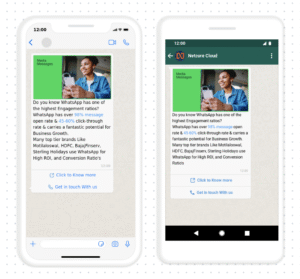Introduction: Whatsapp Marketing
India is home to more than 535 million active WhatsApp users, making it the platform’s largest market worldwide. It’s not just a messaging app anymore—it’s where families connect, friends share, and increasingly, where businesses communicate with their customers. Despite this massive penetration, WhatsApp remains one of the most underutilized marketing tools in the Indian digital ecosystem.
As we step into 2025, digital marketing is no longer about shouting louder—it’s about getting smarter. Consumers today demand immediacy, personalization, and convenience. While emails are often ignored and social media platforms are becoming overcrowded with ads, WhatsApp provides a direct, clutter-free, and high-engagement channel that businesses can no longer afford to ignore.
What amplifies this opportunity further is the power of WhatsApp Web. This browser-based version allows businesses and teams to seamlessly manage customer conversations, send campaigns, and handle inquiries in real-time, right from their desktops. It’s fast, efficient, and ideal for scaling personalized communication without losing the human touch.
In this blog, you’ll learn how to turn WhatsApp into a revenue-generating machine. We’ll walk you through why 2025 is the ideal year to start, how to set up a business profile, use WhatsApp Web for marketing automation, and apply real-world strategies that work in the Indian market. Plus, we’ll share a powerful case study and actionable tips you can apply immediately.
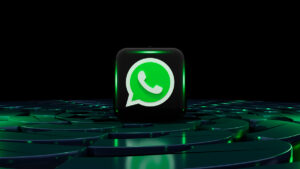
WhatsApp in India: The Silent Revolution
Over the past decade, WhatsApp has quietly transformed from a messaging app into a cultural phenomenon in India. With over 535 million active users, WhatsApp isn’t just popular—it’s essential. It’s the first app people check in the morning, the go-to for sharing news, and increasingly, a preferred tool for businesses to engage with customers. From small towns to metro cities, WhatsApp has embedded itself deeply into India’s digital lifestyle.
What makes WhatsApp so powerful in India? The answer lies in its simplicity and trust. Unlike emails that often land in spam folders or SMS messages that feel impersonal and limited, WhatsApp provides real-time, end-to-end encrypted communication. For many Indians, especially in non-English speaking regions, WhatsApp feels more secure, more human, and more direct. It supports regional languages, voice notes, multimedia sharing, and even video calls—all in one app.
Demographically, WhatsApp’s reach cuts across all age groups and income levels. Students, professionals, homemakers, and entrepreneurs all use it daily. This universality makes WhatsApp an incredible platform for businesses aiming to connect with a broad audience, particularly in Tier 2 and Tier 3 cities where email access may be limited but mobile-first behavior is dominant.
Adding to this revolution is WhatsApp Web, a desktop-friendly version that enables businesses to manage messages efficiently, send bulk responses, and maintain a consistent tone with customers across the board. Whether it’s customer service, follow-ups, or promotional campaigns, WhatsApp Web enhances accessibility and speed—two factors critical in today’s competitive market.
As businesses begin to realize the massive engagement potential that WhatsApp holds, the silent revolution is turning into a powerful movement. Yet, many brands still aren’t utilizing this channel to its full capacity. If you’re ready to start leveraging WhatsApp as a serious marketing tool, partner with WeeDigitally—India’s trusted name in performance-driven marketing.
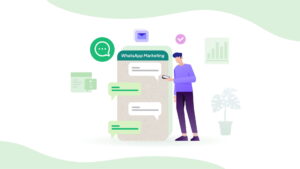
The Goldmine: Why WhatsApp Marketing Will Dominate in 2025
As digital competition intensifies in 2025, businesses in India must look beyond conventional channels to connect meaningfully with customers. Enter WhatsApp—the quiet juggernaut transforming digital communication into conversion-driven interactions. What makes it a goldmine isn’t just its massive user base, but the evolution of WhatsApp Business tools and a shift in consumer behavior that favors mobile-first, personalized experiences.
In recent years, WhatsApp Business and WhatsApp Business API have unlocked powerful capabilities for brands. From automated greetings and quick replies to full-scale chatbot integrations, the API allows businesses to scale personalized conversations without losing the essence of human touch. These tools enable eCommerce brands to send cart reminders, allow service-based companies to automate appointment bookings, and help local stores broadcast hyper-local offers—all within the app that consumers already trust.
What’s fueling this growth even further is a major shift in market behavior. Indian consumers today expect instant gratification—they want answers, offers, and support now, not in 24 hours. Traditional channels like email are too slow, often ignored, and feel outdated. SMS, while faster, lacks interactivity and is frequently associated with spam. In contrast, WhatsApp delivers real-time, multimedia-rich conversations that feel personal and timely.
Add to that the functionality of WhatsApp Web, and businesses get a desktop dashboard to manage chats, handle inquiries, and execute campaigns at scale. It’s perfect for sales teams, customer service reps, and marketing departments looking to streamline workflow without losing engagement quality.
In short, WhatsApp is redefining direct-to-consumer marketing in India, and those who act now stand to gain a massive first-mover advantage. It’s affordable, scalable, and resonates with the mobile-first Indian audience better than any other platform.
Benefits of WhatsApp Marketing for Indian Brands
For Indian businesses—especially startups, local stores, and micro-brands—WhatsApp is proving to be a game-changer in 2025. With minimal setup and maximum impact, WhatsApp marketing offers a suite of benefits that traditional channels struggle to match. At a time when attention spans are short and consumer expectations are high, WhatsApp delivers speed, personalization, and cost-efficiency in one seamless package.
One of the most powerful advantages is WhatsApp’s incredible open rate—over 90%. Unlike emails that often end up unread or filtered as spam, WhatsApp messages are usually opened within minutes. This makes it an ideal channel for time-sensitive updates, limited-time offers, or high-priority customer notifications.
Another standout feature is the human-like interaction that WhatsApp facilitates. Brands can use natural language, emojis, voice notes, and even personalized videos to create friendly, relatable conversations. This conversational tone increases trust and engagement, especially in a culture like India’s, where customers value human connection over corporate tone.
Then there’s multilingual support, which is crucial in a country as linguistically diverse as India. WhatsApp allows businesses to communicate with customers in their native language, creating a personalized experience that boosts loyalty and conversion rates. Whether it’s Hindi, Tamil, Bengali, or Marathi—WhatsApp speaks the language of your audience.
What’s more, WhatsApp is significantly more cost-effective than paid ads on platforms like Google or Facebook. For micro-brands with limited budgets, this is a big win. With WhatsApp, you can engage an audience directly without spending a fortune on ad impressions or clicks.
Using WhatsApp Web, businesses can take this a step further by efficiently managing responses, organizing customer conversations, and handling multiple chats simultaneously—all from a desktop interface. It’s the ideal tool for teams that want to scale engagement without compromising on quality.
Whether you’re a boutique brand or a service-based business, leveraging WhatsApp marketing gives you a competitive edge in India’s fast-growing digital economy.
How to Set Up WhatsApp Business for Marketing Success
Setting up WhatsApp Business is the first step toward tapping into one of India’s most effective digital marketing channels. Designed specifically for small and medium businesses, it offers a suite of features to manage, automate, and optimize customer communication. Whether you’re a solopreneur or scaling a team, this setup can get you moving in the right direction.
Step-by-Step WhatsApp Business Setup:
- Download the WhatsApp Business App from the Google Play Store or Apple App Store.
- Register your business number (preferably a dedicated number not used for personal WhatsApp).
- Verify your number via OTP, then grant permissions to access contacts and files.
- Set your Business Name—this can’t be changed later, so choose wisely.
- Fill out your Business Profile with your logo, website, store hours, address, and short bio.
Profile Optimization Tips:
- Use a recognizable brand logo as your profile picture.
- Include clickable links to your website or product pages.
- Write a short and clear business description using relevant keywords like “home décor in Mumbai” or “organic skincare India.”
Smart Messaging Tools:
- Labels: Organize contacts by categories such as “Leads,” “New Orders,” “VIP Clients,” etc.
- Greeting Messages: Automatically welcome users when they message you for the first time.
- Quick Replies: Save time with predefined responses to FAQs or repeated queries.
These tools help you maintain a professional presence, save time, and scale personalized communication effortlessly.
Now, let’s clear the confusion between WhatsApp Business and WhatsApp Web.
- WhatsApp Business is the mobile application that includes marketing tools, contact management, and automation.
- WhatsApp Web is the browser-based interface that mirrors your account and allows you to manage chats from your desktop. It’s especially useful for teams, letting them handle multiple conversations with better speed and organization.
Using WhatsApp Web to Scale Marketing Operations
As businesses grow, so does the complexity of managing multiple customer conversations at once. That’s where WhatsApp Web comes in—it acts as a powerful extension of your WhatsApp Business account, allowing you to handle marketing and customer service operations right from your desktop.
WhatsApp Web simplifies desktop operations by offering a clean, browser-based interface that mirrors your mobile chats. This means you can type faster, respond more efficiently, and manage multiple conversations without juggling between devices. For marketing teams, it’s a productivity booster that eliminates the limitations of small smartphone screens and clunky interfaces.
In the real world, Indian businesses are already leveraging WhatsApp Web in various impactful ways:
- Customer Service Teams use it to manage inquiries in real-time, handle post-sale queries, and provide instant support—all while tracking the conversation history effortlessly.
- Sales Teams initiate follow-ups, nurture leads, and even close deals directly from their desktops.
- Marketing Departments use WhatsApp Web for bulk messaging (where compliant), delivering personalized offers, event invites, or new product launches.
- Internal Team Collaboration improves as shared business numbers allow multiple agents to engage with customers seamlessly.
What truly elevates WhatsApp Web’s potential is its compatibility with automation and CRM tools. By integrating platforms like WATI, Interakt, or Zoko, businesses can:
- Set auto-responders based on keyword triggers
- Assign conversations to specific team members
- Schedule messages and reminders
- Access in-depth analytics on message performance
These integrations transform WhatsApp Web from a basic desktop mirror to a robust marketing command center, enabling scale without sacrificing personalization.
For Indian brands aiming to operate smarter in 2025, WhatsApp Web isn’t just a convenience—it’s a necessity. It brings efficiency, clarity, and structure to your WhatsApp marketing workflow.
Winning WhatsApp Strategies for Indian Startups & SMBs
For Indian startups and small businesses, WhatsApp offers a unique advantage—direct, personal, and high-converting communication. But simply having a WhatsApp Business account isn’t enough. To truly maximize the platform’s potential in 2025, you need a smart strategy that blends automation with authentic engagement. Here are some proven tactics designed to work for the Indian market.
Click-to-Chat Campaigns
One of the most effective tools in WhatsApp marketing is the Click-to-Chat link. You can embed this link in Facebook or Google Ads, Instagram bios, or even SMS campaigns. When users click it, a WhatsApp chat opens instantly, skipping forms and friction. This not only improves conversion rates but gives you a direct path to continue nurturing the lead through WhatsApp itself.
Lead Generation via QR Codes & Website Plugins
In-store or on print ads, WhatsApp QR codes make it easy for customers to initiate chats. You can also embed WhatsApp chat plugins on your website, enabling visitors to message you directly for support, quotes, or consultations. This immediate access builds trust and captures leads at the point of interest.
Broadcast Lists vs. Groups
For businesses, broadcast lists are far more effective than groups. Broadcasts let you send personalized messages to many people without revealing recipients or turning it into a group chat. It’s ideal for sending product updates, offers, or reminders. Just ensure all recipients have saved your number to receive the messages. Groups, while interactive, often get noisy and aren’t suited for promotions.
Strategic Follow-Ups & Funnel-Based Messaging
Don’t let leads go cold. Build a messaging funnel:
- Initial engagement via Click-to-Chat
- Follow-up message within 24 hours with added value
- Offer drop after interest is confirmed
- Feedback collection to close the loop
Using WhatsApp Web, you can manage this funnel more efficiently from your desktop, especially when handling high volumes of leads and queries.
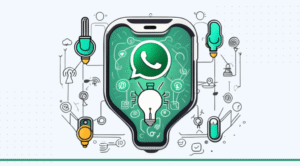
Case Study: A D2C Indian Brand’s WhatsApp Success Story
Background
Meet “GlowVeda,” a D2C Ayurvedic skincare brand based in India that launched in late 2022. Despite a strong product line and growing Instagram presence, GlowVeda struggled with low repeat purchases and poor post-sale engagement. Their challenge was clear: how to build stronger customer relationships without spending a fortune on retargeting ads.
Strategy & Setup
GlowVeda partnered with WeDigitally in early 2023 to develop a robust WhatsApp marketing strategy. The first step was setting up a fully optimized WhatsApp Business account with a branded profile, product catalog, and quick replies.
They used Click-to-Chat links in their order confirmation pages and Instagram stories to encourage customers to connect on WhatsApp. Once customers opted in, GlowVeda tagged them with labels like “First-Time Buyer,” “Loyal Customer,” and “Needs Follow-Up” to segment and personalize communication.
Tools & WhatsApp Web Integration
To streamline operations, the team relied heavily on WhatsApp Web. Their marketing and support teams handled queries, feedback, and promotions right from desktop, improving response time and maintaining a centralized message log.
They integrated WhatsApp with a lightweight CRM using a third-party tool to:
- Automate personalized follow-ups after each purchase
- Send skincare tips based on previous purchases
- Trigger re-engagement messages after 30 days of inactivity
Results
Within 90 days, GlowVeda achieved:
- 22% increase in repeat purchases
- 35% higher open rates for promotional messages compared to email
- Faster resolution of support queries, reducing average response time by 40%
- A significant drop in cart abandonment, thanks to reminder messages sent within 24 hours
Lessons Learned
GlowVeda’s success proves that WhatsApp isn’t just a support tool—it’s a high-performance marketing engine when used strategically. Key takeaways include:
- Segment your audience using labels and custom tags
- Use WhatsApp Web for team collaboration and faster service
- Automate value-driven follow-ups to increase customer lifetime value
WhatsApp Marketing Automation: Tools & Techniques for 2025
As WhatsApp continues to dominate India’s digital space, automation is the secret weapon that allows brands to scale their messaging without compromising personalization. In 2025, automation tools integrated with WhatsApp and WhatsApp Web are helping businesses deliver fast, efficient, and tailored communication to thousands of customers in real time.
Top Automation Tools for WhatsApp
Several platforms have emerged to make WhatsApp automation simple and scalable:
- WATI: Perfect for SMBs, WATI offers chatbot builders, live chat features, and broadcasting tools with CRM integrations.
- Zoko: A great all-in-one platform for sales, support, and marketing. It enables multi-agent support on a single WhatsApp number.
- Twilio: A developer-friendly platform allowing advanced workflows, notifications, and programmable messaging APIs.
- Interakt: Designed for D2C brands, Interakt offers broadcast campaigns, automated workflows, and catalog sharing with abandoned cart recovery.
These tools transform WhatsApp into a high-converting marketing machine by reducing manual effort and ensuring timely responses.
Automation Techniques That Work
Automation isn’t about spamming—it’s about enhancing customer experience. With tools like these, you can:
- Deploy chatbots that answer FAQs, take orders, or guide users to the next step.
- Use auto-responders to reply instantly during non-working hours or after form submissions.
- Trigger personalized messages based on user actions, such as browsing a product, abandoning a cart, or engaging in past campaigns.
CRM Integration: The Game Changer
By integrating WhatsApp with your CRM, you can take personalization to the next level. Imagine automatically sending a skincare routine to a repeat customer based on their previous purchases, or a special birthday discount to a loyal client. CRM-connected automation turns WhatsApp from a communication tool into a full-funnel marketing engine.
Through WhatsApp Web, your team can monitor, manage, and adjust these automation flows in real-time, giving your operations the flexibility and scalability needed to thrive in 2025.
Common Mistakes to Avoid in WhatsApp Marketing
While WhatsApp is an incredibly powerful tool for customer engagement, misusing it can quickly lead to reduced trust, blocked numbers, and even being banned from the platform. To ensure your WhatsApp marketing campaigns thrive in 2025, it’s crucial to steer clear of common pitfalls that many Indian businesses still make—knowingly or unknowingly.
Over-Messaging or Spamming
One of the biggest mistakes is sending too many messages. Just because WhatsApp has a high open rate doesn’t mean you should flood your audience daily. Unlike email, WhatsApp is a personal space. Over-messaging can feel intrusive and lead to users blocking your number. Stick to value-driven communication, not volume.
Not Segmenting Your Audience
Another frequent error is sending the same message to everyone. WhatsApp Business offers labels and categories—use them. Segmentation allows you to personalize messages based on customer behavior, preferences, or buying history. For example, new customers should get welcome messages, while loyal buyers may appreciate exclusive deals.
Ignoring Analytics
Without measuring what works, you’re flying blind. Many businesses don’t track metrics like open rates, response times, or click-throughs. Platforms like WATI and Interakt offer basic analytics, while CRMs connected to WhatsApp Web can deliver deeper insights. Regularly review your data to refine your approach and increase conversions.
Not Setting Opt-In Policies
Sending unsolicited messages is not only bad etiquette—it’s against WhatsApp’s policies. Always ensure that users opt-in before you start messaging them. Use website forms, QR codes, or click-to-chat links to gain proper consent. This not only protects your number but builds trust with your audience.
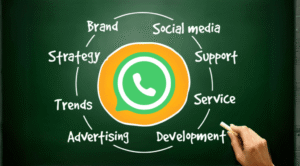
FAQs Section
What is WhatsApp marketing and how does it work?
WhatsApp marketing involves using WhatsApp to promote products, engage customers, and build relationships. Businesses use WhatsApp Business or the WhatsApp Business API to send personalized messages, offers, updates, and customer support. It’s a direct, conversational, and cost-effective way to reach users where they are most active—on their smartphones.
Is WhatsApp marketing legal in India?
Yes, WhatsApp marketing is legal in India, provided businesses follow proper consent-based practices. Customers must opt-in before receiving promotional messages. Using click-to-chat links, web forms, or QR codes ensures compliance. Always respect user privacy and WhatsApp’s policies to maintain trust and avoid penalties.
How can WhatsApp Web help in business operations?
WhatsApp Web enables businesses to manage chats directly from a desktop browser, boosting productivity and speed. It allows teams to handle customer support, send messages, and follow up efficiently. For companies managing high volumes of inquiries, WhatsApp Web is essential for streamlined communication and centralized workflow.
What tools are best for WhatsApp automation in 2025?
Top tools include WATI, Zoko, Twilio, and Interakt. These platforms help businesses automate messages, deploy chatbots, and integrate WhatsApp with CRMs. They allow scheduled campaigns, analytics tracking, and funnel automation—turning WhatsApp into a powerful, scalable marketing engine.
Is WhatsApp more effective than email for Indian users?
Yes, especially in India. WhatsApp boasts over 90% open rates, far outperforming email. It supports multimedia content, local languages, and real-time communication, which resonate more with Indian audiences. It’s a personal, trusted platform, making it ideal for marketing in both urban and rural settings.
Can small businesses use WhatsApp without paid tools?
Absolutely. Small businesses can start with the free WhatsApp Business app and use features like labels, greeting messages, and quick replies. For basic customer engagement and promotions, no paid tools are necessary. As operations scale, they can explore automation tools for efficiency.
Conclusion: Why 2025 is the Year to Double Down on WhatsApp
If there’s one marketing opportunity Indian brands can’t afford to overlook in 2025, it’s WhatsApp. With more than 535 million active users in India and a growing suite of business tools, WhatsApp has evolved into a powerful platform for lead generation, customer service, and sales conversions. It offers what modern consumers crave—real-time, personalized, mobile-first communication.
The beauty of WhatsApp lies in its cost-effectiveness and scalability. For startups and small businesses, it delivers high engagement at a fraction of the cost of paid advertising. As your customer base grows, automation tools and WhatsApp Web integrations allow your team to handle thousands of messages with efficiency and a personal touch.
But the window of opportunity won’t stay open forever. As more brands realize WhatsApp’s potential, the competition will become fiercer. Early adopters already enjoy high open rates and brand loyalty, while latecomers may struggle to stand out in a cluttered inbox.
Now is the time to build your strategy, set up your systems, and start creating meaningful conversations through WhatsApp. From setup and segmentation to automation and analytics, every feature is geared toward helping your brand succeed in the crowded digital landscape.
Call: +91 9953304887
Email: info@weedigitally.com
Visit: https://weedigitally.com/
Address: House- 54 Roshan Garden Phase-2, Najafgarh, New Delhi-110043

